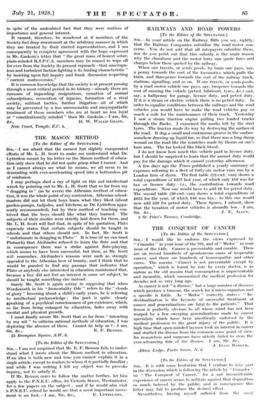RAILWAYS AND ROAD POWERS [To the Editor of the SPECTATOR.]
SIR,—In your article on the Railway Bills you say, rightly, that the Railway Companies subsidize the road motor con- cerns. You do not add that all ratepayers subsidize them, nor do you point out that this subsidy is the main reason why the charabanc and the motor lorry can quote fares and charges below those quoted by the railway. When one travels, or sends goods, by train one pays, say, a penny towards the cost of the locomotive which pulls the train, and threepence towards the cost of the railway track, stations, signalling, and so on. If one travels, or sends goods, by a road motor vehicle one pays, say, twopence towards the cost of running the vehicle (petrol, lubricant, tyres, &c.) and, say, a halfpenny for garage, licence duty, and petrol duty. If it is a steam or electric vehicle there is no petrol duty. In order to equalize conditions between the railways and the road vehicles you would have to make the road vehicles pay so much a mile for the maintenance of their track. Yesterday I saw a steam traction engine pulling two loaded trucks through the Backs. I examined the marks left by the steel tyres. The tractor made its way by deitroying the surface of the road. It dug a small and continuous groove in the surface somehow drawing up liquid tar, so that there was a long damp wound on the road like the scratches made by thorns on one's bare arm. The tar looked like black blood.
I do not ktiow how much this vehicle paid in licence duty, but I should be surprised to learn that the annual duty would pay for the damage which it caused yesterday afternoon.
• A few days ago the Times published a yearly summary of expenses referring to a fleet of forty-six motor vans run by a London firm of dyers. The first table (12-cwt. van) shows a total expenditure of £357 last year, of which only £16 was for tax or licence duty—i.e., the contribution towards road expenditure. Now one would have to add £8 for petrol duty. The second table (30-cwt. van) shows a total expenditure of £655 for the year, of which £40 was tax ; to this one would now add £20 for petrol duty. These figures, I submit, show that the taxation of motor vehicles is absurdly low.—I am,




















































 Previous page
Previous page